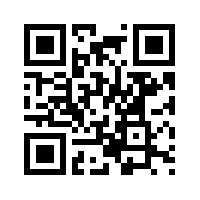Although quick response (QR) codes have been around for 20 years, their use as a mainstream marketing tactic has yet to take hold in the United States. The idea for QR codes arose from a desire to create an alternative to barcodes that would enable more information to be packed into a code. Widespread use of QR codes has emerged in the past few years due to consumer adoption of smartphones with capabilities to scan codes easily (that is of course if your scanning app works well). Educators, museums, businesses, and anyone else with a QR code can point us toward additional information and deeper engagement opportunities.
New Toy
To this point, QR codes have been less than remarkable as a marketing tool. Why? The answer is no different than why many web sites and social media accounts are lackluster- the creator has not figured out how to strategically use them. Creating QR codes is easy- the image at the top of this post was created in seconds- creating QR codes that are valuable for the target audience apparently is more challenging. Often, a QR code merely points one to a company’s website homepage. Assuming someone takes action and scans the code, what are they supposed to do once they arrive- look at the website in awe and be amazed that they were magically taken there by scanning an image? It is no different than when we get a new toy, one that has cool features but turns out to be more sizzle than steak. For QR codes to be taken seriously as a valuable tool in the IMC toolbox, focus must turn to how to use QR codes in a way that adds value to the consumer while achieving goals of the marketer.
The QR Value Proposition
Should you be using QR codes to enhance your brand’s online marketing efforts? Here are three benefits to consider:
- QR codes act as a “fast pass” to your online presence – Just as using FastPass at Walt Disney World is a shortcut to the ultimate goal of experiencing attractions, a QR code is a direct line to where you want to take searchers. Help consumers save time and give them a fast pass.
- You can facilitate call to action – Perhaps the last destination you want to take people scanning your QR code is the homepage of your website. You may have an awesome website, but people do not want to be there. They are looking for information or solutions to problems. Meet their needs by steering them to a specific place to sign up for email newsletters, download an e-book, or even buy your product.
- Unleash your content – In an environment where content rules and marketers have embraced their role as publishers, your company or brand is likely amassing quite a bit of content- videos, blog posts, case studies, and more. QR codes can point searchers to specific content pieces or larger collections of content such as your YouTube channel.
Apply Old Thinking
QR codes may be an emerging, even unproven marketing technology. If you are evaluating whether to use QR codes in your IMC strategy, a simple but effective approach to take is to consider them from your customer’s perspective. Why should they be compelled to scan your codes? Getting straight to the point- what’s in it for them? It’s the classic marketing question applied to buyer behavior. What are their motivations to scan and process information delivered via a QR code? How will it help them or add value? Once these questions are answered, decisions about how to use QR codes should be easier to make.

